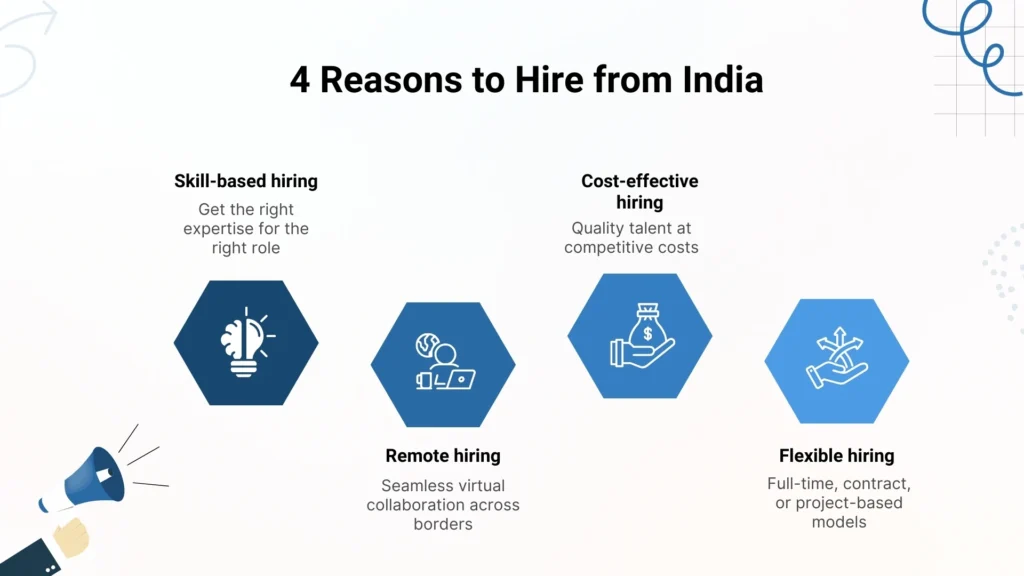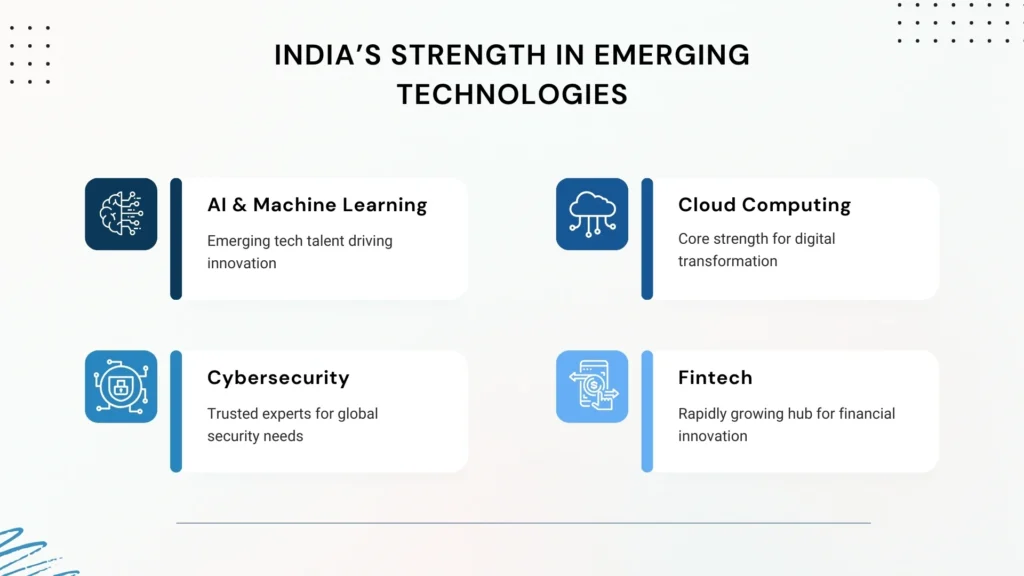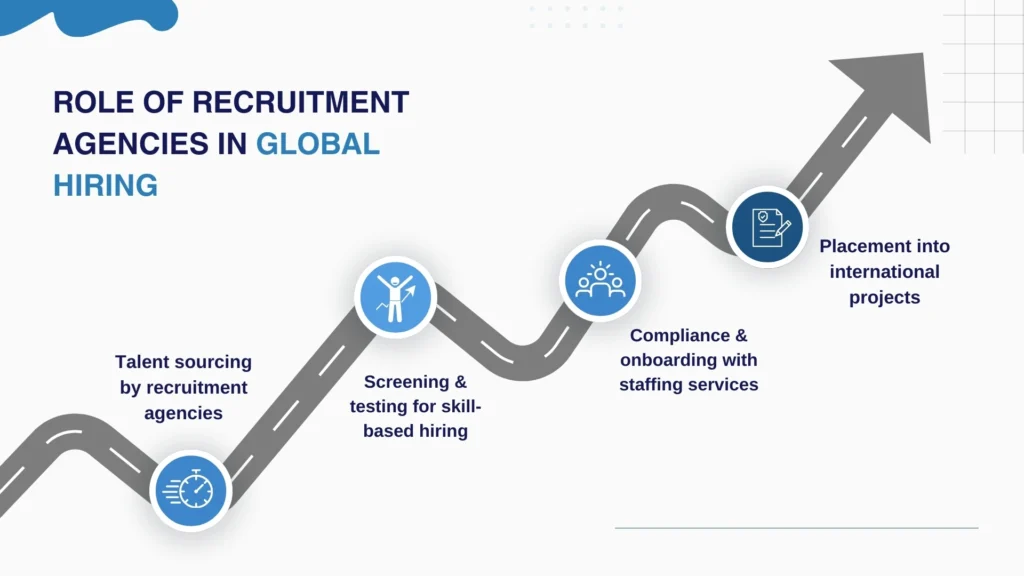In the evolving landscape of global hiring, one truth is becoming increasingly clear: India is no longer just a back-office destination, it’s the beating heart of the global workforce. With a massive Indian talent pool, a booming tech ecosystem, and a shift toward skill-based hiring, international companies are turning to India not just for volume, but for value. The future of global recruitment is being shaped in India’s classrooms, co-working spaces, and innovation hubs.
India’s Youth Advantage: A Demographic Goldmine
India is home to the world’s largest youth population, with over 808 million people under the age of 35. This demographic dividend is unmatched globally. For companies seeking fresh, trainable, and digitally native talent, India offers a pipeline that’s both deep and dynamic. The country produces over 1.5 million engineers annually, and its universities are increasingly aligned with global skill demands from AI and machine learning to blockchain and cybersecurity.
This surge of emerging tech talent is not just theoretical. Indian professionals are leading global teams, building unicorns, and contributing to open-source communities at scale. For international firms, tapping into this Indian talent pool means accessing a workforce that’s young, ambitious, and future-ready.
The Scale of India’s Workforce Advantage
India’s demographic story is unique. With the world’s largest youth population, India offers a dynamic global workforce that is both highly skilled and abundant. A majority of its working-age citizens are under 35, making it a sustainable source of talent for decades to come.

This young workforce is not just large in number; it’s also adaptable. As industries move towards flexible hiring and project-based models, the ability of Indian professionals to quickly adapt to new roles, technologies, and global standards makes them an indispensable part of international growth strategies.
Beyond Cost: Why Companies Value Indian Talent
Many organizations initially turned to India for cost-effective hiring, but the equation has evolved. While affordability remains a factor, international companies now prioritize:
- Skill-based hiring: Employers are increasingly valuing hands-on technical expertise over traditional degree qualifications. Indian professionals with certifications in cloud computing, data science, and cybersecurity are in high demand.
- Emerging tech talent: India has become a hub for AI, blockchain, and advanced software engineering. This specialization is fueling the future of digital transformation worldwide.
- Cultural and communication fit: English proficiency, multicultural exposure, and a collaborative mindset allow Indian professionals to thrive in cross-border teams.

The Role of Recruitment Ecosystem in Global Hiring
To meet global demand, a wide network of recruitment agencies, staffing services, and job recruitment agencies has evolved across India. These firms are not just intermediaries but strategic partners who understand international standards and local employment practices.
- Recruitment companies ensure faster access to talent pools with niche technical and managerial skills.
- Specialized IT recruiting companies in India connect global firms with software engineers, cloud experts, and data analysts.
- Hiring Agencies help businesses identify leadership talent, product specialists, and domain experts across sectors.
- A staffing agency offers short-term or project-based hiring solutions, catering to businesses that need agile and flexible hiring strategies.
Together, these organizations form the backbone of talent outsourcing India, enabling employers worldwide to onboard talent without facing administrative bottlenecks.
Operational Considerations: Compliance, Payroll, and Legal Risks
While the narrative around the Indian talent pool often focuses on skills and costs, international employers must also address the practicalities of hiring.
- Payroll & Tax Compliance: Companies must align with India’s local tax structures, provident fund (PF), employee insurance (ESIC), and other statutory contributions. Ignoring these obligations can result in penalties and reputational risks.
- Employment Contracts: Drafting contracts that respect both local labor laws and global employment standards ensures smoother integration.
- IP & Data Security: As remote employees increasingly handle sensitive data, businesses need strong intellectual property agreements and secure digital infrastructure.
Global employers often turn to partners offering Employer of Record (EOR) solutions or compliance consultancies to navigate these complexities.
The Rise of Remote and Distributed Work
The shift to remote hiring has created opportunities for companies to access Indian professionals without establishing a physical entity in the country. Indian employees are comfortable working across time zones and excel in asynchronous communication models.
This has expanded opportunities for:
- Distributed project teams working across continents.
- Startups leveraging global skills without heavy infrastructure investments.
- Enterprises experimenting with hybrid and remote-first strategies.
With strong digital adoption and infrastructure improvements, India is well positioned to continue being a leader in remote-ready global roles.
Unlocking Talent Beyond Metro Cities
While Tier-1 cities like Bengaluru, Mumbai, and Delhi dominate global hiring conversations, talent outsourcing India is expanding into Tier-2 and Tier-3 cities. These regions bring unique advantages:
- Lower attrition rates compared to saturated metro markets.
- Expanding educational institutions producing qualified graduates.
- Reduced cost structures for both employees and employers.
For international companies, this regional diversity means more flexible hiring models and access to untapped skills.
Retention and Growth: Building Careers, Not Just Jobs
One overlooked factor in global hiring strategies is retention. Hiring from India is not just about filling positions; it’s about nurturing long-term careers.
Effective approaches include:
- Upskilling Programs: Offering certifications in emerging tech talent areas like AI, cloud, and cybersecurity.
- Employee Engagement Models: Tailored strategies to keep Indian employees aligned with organizational culture.
- Career Pathways: Clear advancement structures to reduce turnover and improve loyalty.
Companies that invest in professional growth see stronger productivity and longer tenure from their Indian teams.
The Role of Technology in Modern Recruitment
Digital transformation is reshaping recruitment itself. Advanced tools like AI-driven assessments, automated resume screening, and skills-based tests are changing how recruitment companies and job recruitment agencies operate.
For international businesses, this means:
- Faster hiring cycles.
- More precise matching of candidates to roles.
- Better visibility into the quality and readiness of candidates.
With Indian professionals excelling in tech adoption, these innovations ensure a seamless hiring process.
Reverse Brain Drain: The Return of Global Talent
Another trend that international markets are beginning to leverage is the return of Indian professionals from abroad. Skilled workers who once moved overseas for education and employment are now bringing back global exposure, leadership qualities, and advanced skills to India.
This reverse migration enriches the Indian talent pool, offering a unique blend of international expertise with local market understanding, a powerful combination for global companies.
Practical Onboarding for Global Teams
One topic rarely highlighted is onboarding. International companies hiring remotely from India must adapt onboarding programs to ensure productivity and cultural alignment. Key practices include:
- 90-Day Roadmaps: Structured timelines for role familiarization.
- Cross-Cultural Training: Ensuring seamless collaboration across global teams.
- Mentorship & Buddy Programs: Building belonging and reducing early attrition.

Strong onboarding processes help maximize the potential of remote hiring while addressing engagement challenges.
Why Indian Talent Aligns With Global Market Needs
International markets face pressing challenges: shortage of digital skills, rising labor costs, and pressure to innovate quickly. India addresses these gaps through:
- A vast Indian talent pool across technical and managerial roles.
- Scalable hiring options supported by recruitment agencies and staffing services.
- Strong alignment with global digital transformation needs through emerging tech talent.
- Ready infrastructure for remote hiring and distributed teams.
- The ability to balance affordability with advanced skills, offering truly cost-effective hiring.
FAQ’s
Indian professionals bring a blend of technical expertise, cost efficiency, and adaptability, making them highly valuable in the global workforce.
Recruitment agencies connect global companies with the right Indian talent pool, ensuring skill-based hiring and compliance with hiring regulations.
Yes, cost-effective hiring from India allows businesses to reduce overheads while maintaining high-quality output and productivity.
The Indian talent pool is highly adaptable, making it ideal for flexible hiring, contract roles, project-based hiring, and long-term staffing needs.
Indian professionals excel in emerging tech talent like AI, cloud computing, cybersecurity, and fintech due to strong STEM education and continuous upskilling.
Hiring Agencies use assessments, screening, and skill-based hiring models to match the right candidates to the right global roles.


















